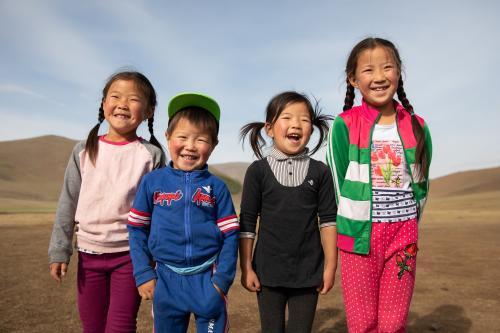Colombia’s 2019 Violence Against Children and Youth Survey (VACS) reported that 41 per cent of girls and 42 per cent of boys in Colombia had experienced some type of violence in childhood.* In response, Colombia took a series of measures to prioritise ending violence against children, and became a Pathfinding country in August 2019 when President Ivan Duque launched the National Alliance to End Violence Against Children, a multi-sectoral platform linking various government agencies. The Colombian Institute for Family Welfare (ICBF) was appointed the focal point ministry to lead the development of an evidence-based and costed national action plan that would reduce violence children by 14.3 per cent by 2022.
In 2020, two critical steps unfolded to help land the national action plan. First, the End Violence Partnership collaborated with USAID’s HEARD Project, Together for Girls, CDC, UNICEF and Universidad de Los Andes to support the government of Colombia in aligning its action plans with the needs identified in the VACS and workshops.
Second, the First Lady of Colombia, Maria Juliana Ruiz, and ICBF Director, Lina Arbeláez, hosted a high-level meeting in June 2020 to discuss support from international agencies. Participants agreed that the End Violence Partnership would support Colombia with an INSPIRE coordination course, co-created with members of the Government of Colombia and tailored to its needs.
This work is now in process and the Colombian National Action Plan 2021-2024 is expected to launch in 2021. The plan focuses on six priorities, including strengthening legal frameworks, guaranteeing comprehensive services, and social mobilisation to change beliefs and behaviours about violence against children.
The Colombian Government is also providing technical assistance to help 32 Colombian departments design regional action plans adapted to local contexts. Colombia also made strong progress in keeping children safe online in 2020. With financial support from the End Violence Fund through the Safe Online initiative, the Red PaPaz organisation used innovative strategies to combat online child sexual exploitation and abuse in collaboration with UNICEF Colombia and Fundación Renacer. Netsmartz, Red PaPaz’ online education programme, was adopted by the Ministry of Education, the Ministry of ICT, and ICBF, enabling it to reach 81 schools across four regions in 2020. Thanks to this programme, teachers now understand more clearly the basic concept of online risks in digital environments — and how to prevent them.
Red PaPaz also provided detailed trainings on online violence for more than 500 public officials, in partnership with Fundación Renacer. Teachers, police authorities, child protection officers, tourism authorities, and other public officials learned how to detect, prosecute and communicate about online violence against children. Local boards and committees in Bogotá, Cartagena, La Guajira and El Cesar also were trained.
In addition, Red PaPaz strengthened and expanded the national hotline. Red PaPaz introduced a new categorization system, which will enable more efficient and detailed data collection, enhanced security, and faster URL processing. To respond to the increased risks for children in 2020, Te Protejo launched a campaign called “#LoReportoPeroNoLoComparto” (I report it but I don’t share it). The campaign reached 3.7 million Instagram accounts, made 32 million Facebook impressions, and registered 2,235 users.
Read more about the progress of Pathfinding Countries in our 2020 Annual Report.
* These surveys were led by the Government of Colombia with support from the U.S. Centers for Disease Control and Prevention (CDC), as part of the Together for Girls partnership.

